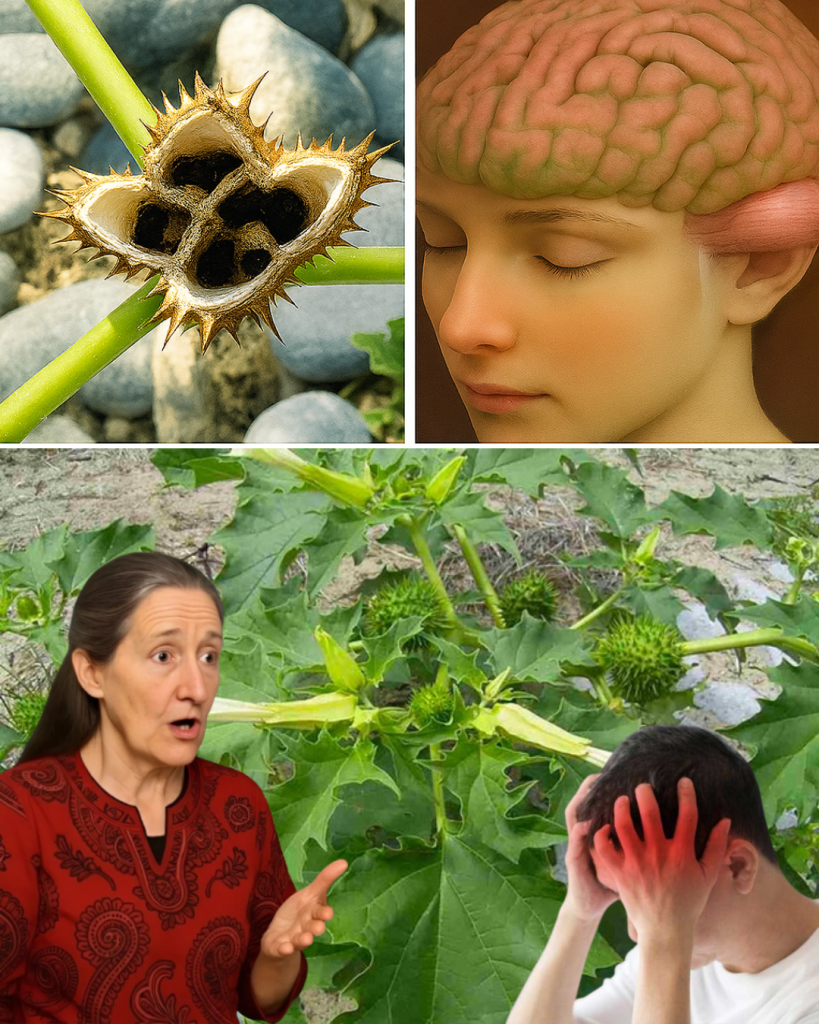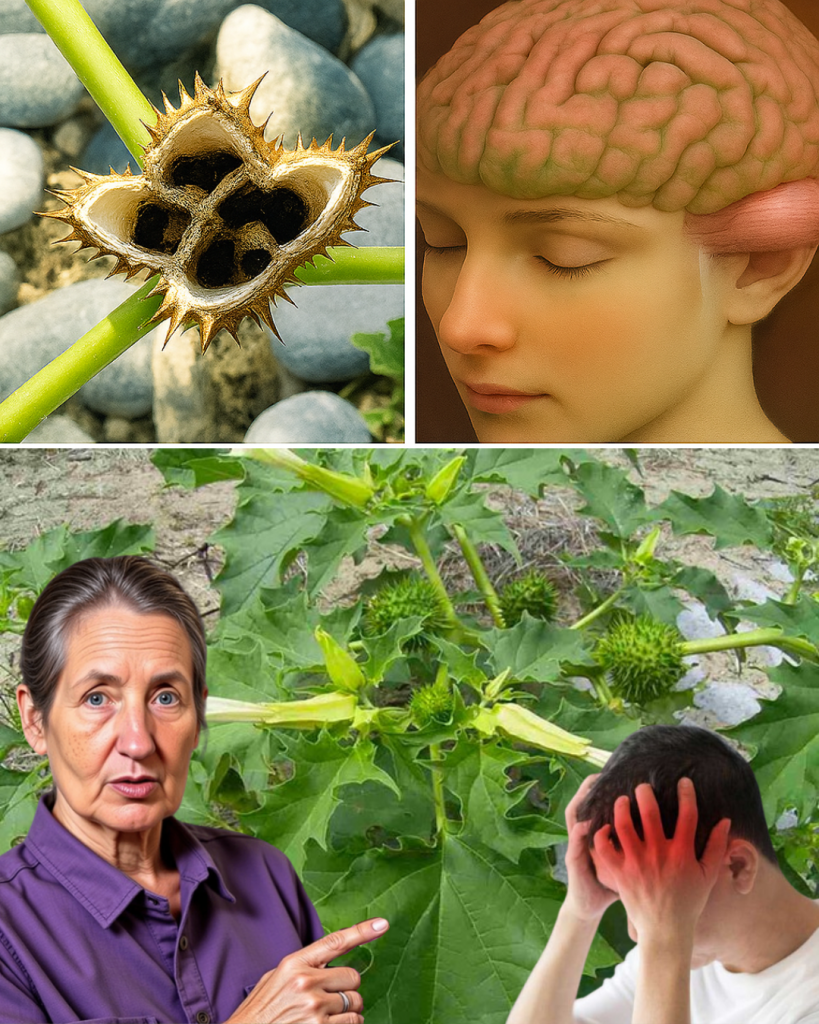🌿 Imagine a plant so potent it’s been revered and feared for centuries, woven into the fabric of ancient healing and sacred rituals. Datura stramonium—known as jimsonweed, thorn apple, or devil’s trumpet—is a captivating enigma in the world of herbal medicine. Its striking flowers and spiky pods hide a powerful secret: a blend of compounds that can heal or harm, depending on how they’re used. For health-conscious individuals curious about nature’s remedies, Datura offers a compelling glimpse into traditional wellness practices, but it demands respect and caution. Dive into this guide to uncover the plant’s historical uses, modern scientific insights, and why safety is non-negotiable when exploring its potential.

What Is Datura Stramonium?
🌸 Datura stramonium is a fast-growing annual plant native to North America, now thriving across the globe. Its trumpet-shaped white or purple flowers, jagged leaves, and thorny seed pods make it unmistakable. Every part of the plant—seeds, leaves, flowers, and roots—contains potent tropane alkaloids like atropine, scopolamine, and hyoscyamine. These compounds, which act on the nervous system, have fueled Datura’s use in traditional medicine for centuries while earning it a reputation as one of nature’s most toxic herbs.
This duality—remedy and risk—makes Datura a fascinating subject for those intrigued by plant-based healing. But its power comes with a warning: misuse can lead to serious consequences. Let’s explore how ancient cultures harnessed this plant and why caution is key today.
Traditional Uses in Folk Medicine
🪴 For centuries, Datura stramonium has held a sacred place in indigenous and traditional healing systems, used with precision by skilled herbalists and shamans. Its applications were never casual, often reserved for rituals or medicinal purposes under strict guidance. Here’s how it was historically employed:
🫁 Respiratory Relief: Dried leaves were smoked or burned as incense to ease asthma or breathing difficulties, offering temporary relief from respiratory discomfort.
🩹 Pain Management: Poultices or topical preparations were applied to soothe sore muscles, joint pain, or wounds, leveraging the plant’s sedative properties.
😴 Sedation and Sleep: In minute doses, Datura was used to promote deep rest or induce vivid dream states, often in spiritual or healing contexts.
✨ Spiritual Ceremonies: Cultures across Native American, African, and Indian traditions used Datura to facilitate visions, spiritual journeys, or connections with ancestral spirits during sacred rituals.
These practices were guided by experts who understood the plant’s potency and risks, ensuring safe use through precise dosing and preparation. Modern users must approach Datura with the same reverence and caution.
How Datura Impacts the Body
🧠 The magic—and danger—of Datura lies in its tropane alkaloids: scopolamine, atropine, and hyoscyamine. These anticholinergic compounds block acetylcholine, a neurotransmitter critical for muscle movement, memory, digestion, and other bodily functions. In controlled settings, they’ve been harnessed for medical purposes, but their potency makes them risky outside clinical environments.
In modern medicine, Datura’s compounds are used in highly regulated forms:
🚗 Scopolamine: Found in motion sickness patches to reduce nausea and dizziness.
🩺 Atropine: Used in emergencies to increase heart rate or dilate pupils during eye exams.
🌿 Hyoscyamine: Employed to relieve gastrointestinal spasms or calm digestive issues.
However, raw Datura is far from safe. Even small amounts can cause severe symptoms, including:
- Dry mouth and blurred vision
- Rapid heartbeat and confusion
- Hallucinations or delirium
- Loss of coordination or consciousness
These risks make Datura unsuitable for home use or DIY remedies, emphasizing the need for professional oversight.
Modern Science and Datura’s Potential
🔬 While Datura stramonium is largely avoided in modern wellness due to its toxicity, its alkaloids continue to intrigue researchers. Purified forms of scopolamine, atropine, and hyoscyamine are studied for their pharmaceutical potential, offering insights into how this plant could shape future treatments.
Current research highlights:
🛌 Scopolamine: Explored for managing motion sickness, postoperative nausea, and even depression in controlled settings.
❤️ Atropine: Investigated for its role in stabilizing heart rhythms and supporting critical care.
🍃 Hyoscyamine: Studied for its ability to ease digestive spasms and other gastrointestinal issues.
These applications are strictly regulated, using purified compounds in precise doses. Scientists are also exploring whether Datura’s alkaloids could inspire new treatments for neurological disorders or chronic pain, but only under rigorous clinical conditions. For now, the plant itself remains too risky for casual use.
Why Safety Is Paramount with Datura
⚠️ Datura stramonium’s potency demands respect. Its narrow therapeutic window—where benefits outweigh risks—is so small that even slight miscalculations can lead to serious harm. Whether ingested, applied topically, or inhaled, Datura can cause systemic effects, especially in sensitive individuals.
Here’s how to stay safe:
🚫 Never Use Without Expertise: Only licensed herbalists or medical professionals should handle Datura. Avoid teas, tinctures, or salves unless prescribed by a qualified expert.
🧒 Protect Vulnerable Groups: Children and pets are highly susceptible to Datura’s toxins. Keep the plant out of reach if it grows near your home.
🏥 Seek Immediate Help for Exposure: Accidental ingestion or overdose requires urgent medical attention—call Poison Control or visit an ER immediately.
🌱 Legal but Regulated: In the U.S., Datura is legal to grow but not approved by the FDA for over-the-counter use. Responsible herbalists often avoid it in favor of safer options.
By prioritizing safety, you can appreciate Datura’s historical significance without putting your health at risk.

Safer Alternatives for Natural Wellness
🌼 If you’re inspired by Datura’s traditional uses but wary of its dangers, plenty of gentler herbs offer similar benefits with far less risk. These well-researched alternatives are widely available and better suited for home use:
🌾 Mullein: Supports lung health and eases coughs, making it a safe choice for respiratory wellness.
🌿 Valerian Root: Promotes relaxation and restful sleep without the risks of sedation from Datura.
☕ Chamomile: Soothes digestive discomfort and calms nervous tension, perfect for daily wellness.
🌱 Peppermint: Relieves mild headaches and digestive issues with a refreshing, gentle touch.
💜 Lavender: Eases stress and supports relaxation, ideal for unwinding naturally.
These herbs are accessible, well-tolerated, and backed by centuries of safe use, making them ideal for health-conscious individuals exploring plant-based remedies.
Embracing Datura’s Legacy with Caution
🌟 Datura stramonium is a testament to nature’s complexity—a plant that has captivated healers, shamans, and scientists for centuries. Its historical role in respiratory relief, pain management, and spiritual practices highlights the ingenuity of traditional medicine, while its modern pharmaceutical applications underscore its enduring relevance. Yet, its potent alkaloids demand respect, making it a remedy best left to experts.
For those seeking natural wellness, safer herbs like mullein, chamomile, or lavender offer similar benefits without the risks. By approaching plant medicine with curiosity, caution, and respect, you can honor Datura’s legacy while prioritizing your health. Ready to explore the world of herbal remedies? Start with safer options and consult a professional to guide your journey.
Disclaimer: This article is for informational purposes only and does not replace professional medical advice. Do not use Datura stramonium without expert supervision. Consult a healthcare provider before incorporating new herbs into your wellness routine.









